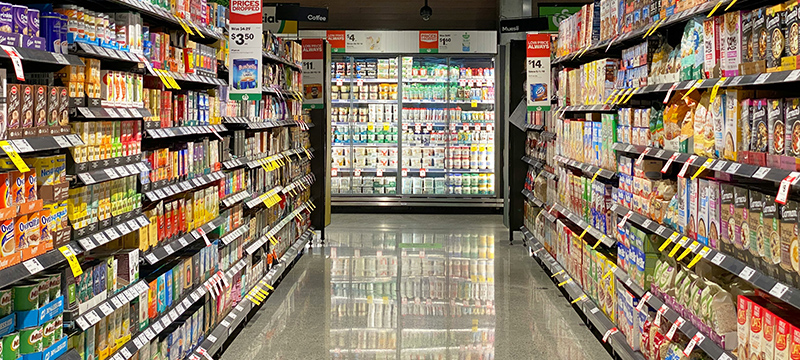Carrefour, one of Europe’s largest supermarket chains, has begun rolling out AI-powered shelf management technology across select stores in France. The initiative, announced this week, aims to optimise stock levels, improve product availability, and enhance customer satisfaction by leveraging machine learning, computer vision, and predictive analytics. This move reflects the growing trend among major retailers to integrate advanced technology into in-store operations to create a more seamless, efficient shopping experience.
The Concept of AI-Driven Shelf Management
Traditional shelf management relies on human staff to monitor inventory, restock products, and ensure that shelves remain tidy and fully stocked. While effective, this approach can be labour-intensive, prone to errors, and slow to react to sudden changes in demand. Carrefour’s AI system addresses these challenges by using cameras, sensors, and machine learning algorithms to monitor stock levels in real time.
Key capabilities of the technology include:
-
Real-time stock monitoring – Cameras track product quantities and alert staff when items need replenishment.
-
Demand forecasting – Machine learning algorithms predict which products are likely to sell faster based on historical sales data, seasonality, and external factors like weather or local events.
-
Shelf-space optimisation – AI suggests the optimal placement of products to maximise visibility and sales, ensuring high-demand items are more accessible.
-
Automated alerts – Staff receive notifications about low stock, misplaced items, or expired products, reducing errors and improving operational efficiency.
By combining these features, Carrefour aims to improve both the efficiency of store operations and the overall shopping experience.
Why Technology Matters in Modern Grocery Retail
The grocery sector has been under increasing pressure from e-commerce and changing consumer expectations. Shoppers expect products to be available when they need them, neatly arranged, and easy to find. At the same time, supermarkets face rising operational costs, labour shortages, and supply-chain challenges.
AI-powered shelf management offers a strategic solution. By automating routine tasks and providing data-driven insights, retailers can:
-
Reduce stockouts – Ensuring that high-demand items are always available
-
Minimise waste – Avoiding overstock of perishable products
-
Enhance labour efficiency – Allowing staff to focus on customer service rather than manual shelf checks
-
Increase sales – Optimising product placement and visibility to encourage purchases
For Carrefour, technology is not just about efficiency; it is also about maintaining competitiveness in a market increasingly influenced by digital-native players.
Implementation Across Stores
Carrefour’s initial rollout involves pilot stores in major French cities, including Paris, Lyon, and Marseille. These stores have been equipped with AI-enabled cameras and sensors, integrated with the chain’s inventory management system. Staff have received training on how to respond to automated alerts, adjust product placement, and use data insights for daily operations.
The pilot phase allows Carrefour to evaluate the system’s effectiveness and refine its algorithms before a broader deployment across the country. Early results have shown promising improvements in shelf availability and reduced labour time spent on monitoring stock manually.
Benefits for Consumers
Shoppers stand to benefit in several ways:
-
Consistent product availability – Popular items are less likely to run out.
-
Improved shopping experience – Products are easier to find, and shelves remain organised.
-
Fresher goods – Perishables are managed more effectively, reducing the chance of expired products on shelves.
-
Enhanced trust – Reliable stock and clear organisation strengthen customer confidence in the store.
By improving operational efficiency and reducing the risk of stockouts, Carrefour can better meet customer expectations while differentiating itself from competitors.
Strategic Significance
The adoption of AI in in-store operations reflects a larger shift in the grocery sector. Retailers are increasingly viewing physical stores not just as points of sale but as integrated hubs in a data-driven retail ecosystem. Carrefour’s investment in AI shelf management is part of a broader digital transformation strategy that includes:
-
Automated replenishment systems – Using predictive analytics to maintain inventory levels.
-
Dynamic pricing models – Adjusting prices based on demand, seasonality, and stock levels.
-
Enhanced online-offline integration – Using store data to support e-commerce, click-and-collect, and delivery services.
-
Operational cost reductions – Freeing staff from repetitive tasks to focus on value-added activities.
This approach aligns Carrefour with global retail trends, where technology is leveraged to enhance efficiency, customer experience, and profitability.
Challenges and Considerations
While AI-powered shelf management offers significant advantages, several challenges must be addressed:
-
Data accuracy – AI systems rely on high-quality data; misreadings or sensor errors can affect decisions.
-
Staff adaptation – Employees must adjust to new workflows and learn to trust AI recommendations.
-
Investment costs – Implementing advanced technology across multiple stores requires capital investment.
-
Privacy concerns – Cameras and sensors must be deployed in ways that respect customer privacy and comply with regulations.
Carrefour has emphasised transparency in data collection and ethical deployment of AI, ensuring that privacy standards are maintained.
Future Expansion
Following successful pilot results, Carrefour plans to expand AI shelf management to hundreds of additional stores across France and potentially other European markets. The company is also exploring integration with predictive ordering systems, automated shelf restocking robots, and enhanced analytics to provide even deeper insights into consumer behaviour.
By combining AI, automation, and data analytics, Carrefour seeks to create a fully optimised in-store ecosystem that meets the needs of modern shoppers while reducing operational costs.
Conclusion
Carrefour’s adoption of AI-powered shelf management represents a significant step forward in the digital transformation of grocery retail. By leveraging advanced technology, the chain improves stock availability, enhances the shopping experience, and increases operational efficiency. As supermarkets face rising competition from e-commerce and changing consumer expectations, initiatives like this demonstrate how innovation can create a more responsive, efficient, and customer-focused retail environment. Carrefour’s move sets a benchmark for European retailers, highlighting the potential of AI to redefine in-store operations in the years ahead.


